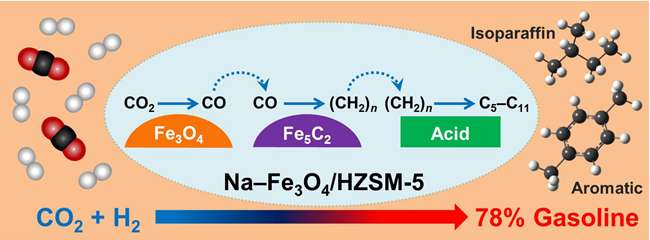Scientists develop efficient multifunctional catalyst for CO2 hydrogenation to gasoline

Converting CO2 from a detrimental greenhouse gas into value-added liquid fuels not only contributes to mitigating CO2 emissions, but also reduces dependence on petrochemicals. However, since CO2 is a fully oxidized, thermodynamically stable and chemically inert molecule, the activation of CO2 and its hydrogenation to hydrocarbons or other alcohols comprises challenging tasks. Most research to date, unsurprisingly, is focusing on selective hydrogenation of CO2 to short-chain products, while few studies on long-chain hydrocarbons, such as gasoline-range (C5-C11) hydrocarbons. The key to this process is to search for a highly efficient catalyst.
The research team led by Dr. SUN Jian and Prof. GE Qingjie in Dalian Institute of Chemical Physics has succeeded in preparing a highly efficient, stable, and multifunctional Na-Fe3O4/HZSM-5 catalyst for the direct production of gasoline from CO2 hydrogenation. This catalyst exhibited 78 percent selectivity to C5-C11 as well as low CH4 and CO selectivity under industrial relevant conditions. And gasoline fractions are mainly isoparaffins and aromatics, thus favoring the octane number. Moreover, the multifunctional catalyst exhibited a remarkable stability for 1,000 h on stream, which definitely has the potential as a promising industrial catalyst for CO2 utilization to liquid fuels.
In-depth characterizations indicate that this catalyst enables RWGS over Fe3O4 sites, olefin synthesis over Fe5C2 sites and oligomerization/aromatization/isomerization over zeolite acid sites. The concerted action of the active sites calls for precise control of their structures and proximity. This study paves a new path for the synthesis of liquid fuels by utilizing CO2 and H2. Furthermore, it provides an important approach for dealing with the intermittency of renewable sources (sun, wind and so on) by storing energy in liquid fuels.
This work was published in Nature Communications.
More information: Jian Wei et al, Directly converting CO2 into a gasoline fuel, Nature Communications (2017). DOI: 10.1038/ncomms15174
Journal information: Nature Communications
Provided by Chinese Academy of Sciences




















